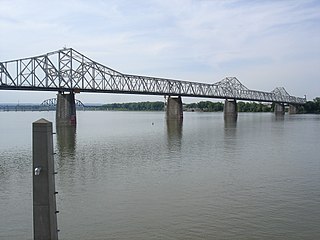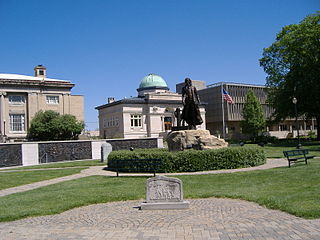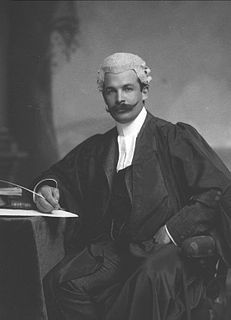
Louisville Waterfront Park is an 85-acre (340,000 m2) municipal park adjacent to the downtown area of Louisville, Kentucky and the Ohio River. Specifically, it is adjacent to Louisville's wharf and Riverfront Plaza/Belvedere, which are situated to the west of the park.

The Big Four Bridge is a six-span former railroad truss bridge that crosses the Ohio River, connecting Louisville, Kentucky, and Jeffersonville, Indiana. It was completed in 1895, and updated in 1929. The largest single span is 547 feet (167 m), with the entire bridge spanning 2,525 feet (770 m). It took its name from the defunct Cleveland, Cincinnati, Chicago and St. Louis Railway, which was nicknamed the "Big Four Railroad". It is now a converted pedestrian and bicycle bridge from Louisville into Jeffersonville, Indiana.

The George Rogers Clark Memorial Bridge, known locally as the Second Street Bridge, is a four-lane cantilevered truss bridge crossing the Ohio River between Louisville, Kentucky and Jeffersonville, Indiana, that carries US 31.

The Old Jeffersonville Historic District is located in Jeffersonville, Indiana, United States. It marks the original boundaries of Jeffersonville, and is the heart of modern-day downtown Jeffersonville. It was placed on the National Register of Historic Places in 1983. The area is roughly bounded by Court Avenue at the North, Graham Street on the east, the Ohio River at the south, and Interstate 65 at the west. In total, the district has 203 acres (0.8 km²), 500 buildings, 6 structures, and 11 objects. Several banks are located in the historic buildings in the district. The now defunct Steamboat Days Festival, held on the second weekend in September, used to be held on Spring Street and the waterfront. Jeffersonville's largest fire wiped out a block in the historic district on January 11, 2004 which destroyed the original Horner's Novelty store.
As with most American cities, transportation in Louisville, Kentucky is based primarily on automobiles. However, the city traces its foundation to the era where the river was the primary means of transportation, and railroads have been an important part of local industry for over a century. In more recent times Louisville has become a national hub for air cargo, creating over 20,000 local jobs. The city has also launched several initiatives to promote both utilitarian and recreational bicycling. In 2016 Walk Score ranked Louisville 43rd "most walkable" of 141 U.S. cities with a population greater than 200,000. In 2015, 11.7 percent of Louisville households were without a car, which decreased to 10.9 percent in 2016. The national average was 8.7 percent in 2016. Louisville averaged 1.61 cars per household in 2016, compared to a national average of 1.8 per household.
Robert L. Waiz, Jr is a politician of Jeffersonville, Indiana. He works in real estate and has been on the city council and served as mayor. Waiz, a Democrat, was first elected mayor in 2003, defeating two-term incumbent Tom Galligan in the May Democratic primary and then defeating Republican Monty Snelling in the November general election. On May 8, 2007, he lost the Democrat primary against Galligan; who went on to win the general election in November 2007. Rob Waiz was the youngest mayor elected in the city's modern history.

Thomas R. "Tom" Galligan is a former three-term mayor of Jeffersonville, Indiana, United States, serving from 1996 to 2003 and again from 2008 to 2011. Galligan succeeded incumbent Raymond Parker Jr. in the 1995 mayoral election and was unseated by challenger, Rob Waiz, during the 2003 election. Galligan defeated Waiz during the 2007 election and was defeated by Clark County Commissioner, Mike Moore, during the 2011 election.

Warder Park is located in Jeffersonville, Indiana on Court Avenue. This park has been a part of the community since the mid-19th century, when it had a bakery to produce hardtack to Union soldiers during the American Civil War. The park wasn't established officially until the year 1881 and is named after then Mayor Luther Warder. Warder had wanted the site for a new city hall, but the city council chose a site between Spring and Pearl on the north side of Market Street for the city hall, and named the park after Warder as a gesture of goodwill. A Carnegie Library was built in 1903.
Huston Quin was mayor of Louisville, Kentucky from 1921 to 1925. He was educated in public schools in Louisville and received a law degree from the University of Louisville School of Law in 1900. He practiced law with the Louisville firm Helm & Bruce until 1908, when he became a city attorney. He left the position in 1912 to reenter private practice, but was appointed to the city attorney position in 1917. In 1918 he was elected to the Kentucky Court of Appeals.
Dale L. Orem is an American businessman, politician and civic leader who served as mayor of Jeffersonville, Indiana from 1984 to 1991. Orem was active in sports by playing for the University of Louisville and later coaching at the school. Orem also was a National Football League official.
Luther F. Warder was born in Kentucky and moved to Jeffersonville, Indiana when he was twenty years old at the start of the Civil War. He then worked in railroad shops and later politics until his death. Luther in 1875 would become mayor. During Luther's administration the County Seat returned to Jeffersonville in 1878 which was based in Charlestown, Indiana since 1811. In 1881 the 3rd City Hall was built. He would serve as mayor until 1883 losing to opponent John M. Glass, but would return as mayor from 1887 to 1891. Warder Park would be named for him in 1881. Warder's son Joseph Warder would serve as mayor of Jeffersonville as well.

Camp Joe Holt was a Union base during the American Civil War in Jeffersonville, Indiana, across the Ohio River from Louisville, Kentucky, on land that is now part of Clarksville, Indiana, near the Big Eddy. It was a major staging area for troops in the Western Theatre of the War, in preparation for invading the Confederate States of America. Its establishment was the first major step performed by Kentucky Unionists to keep Kentucky from seceding to the Confederacy.
Thomas Bogle Rader was a politician and businessman of Jeffersonville, Indiana.
Henry Adolphus Burtt was from Utica, Indiana and was a mayor of Jeffersonville, Indiana.
Harry Clay Poindexter (1857–1937) was mayor of Jeffersonville, Indiana, United States, and son of former Jeffersonville mayor Gabriel Poindexter.

Gregory E. Fischer is an American businessman and entrepreneur who is the 50th Mayor of Louisville, Kentucky. He is a graduate of Louisville's Trinity High School and Vanderbilt University.
The Lewis and Clark Bridge crosses the Ohio River northeast of downtown Louisville, Kentucky; and as part of a ring road around the Louisville metropolitan area, connects Kentucky State Highway 841 with Indiana State Highway 265, connecting two previously disjointed segments of Interstate 265. It was known as the East End Bridge for 30 years since its conception and while under construction, and renamed by Indiana officials on the day of its opening, December 18, 2016. The bridge provides for walking and bicycling. For motor vehicles, tolling began on December 30, 2016.












